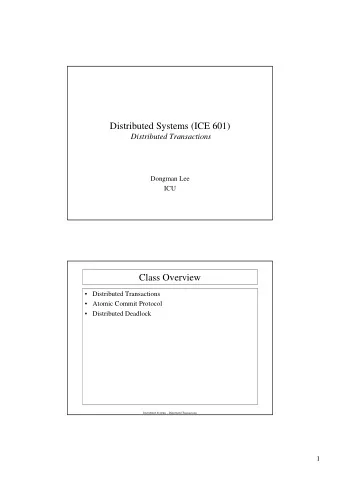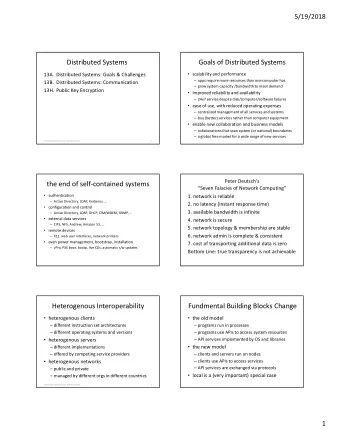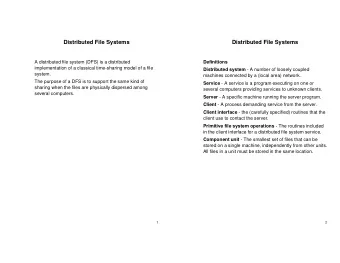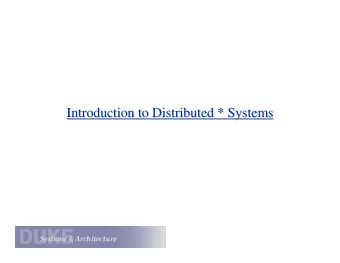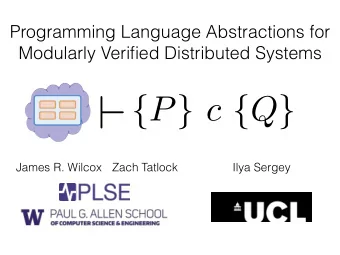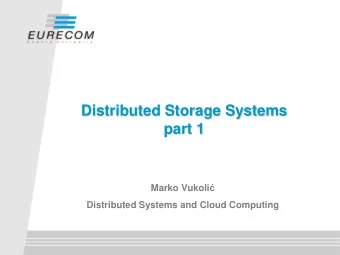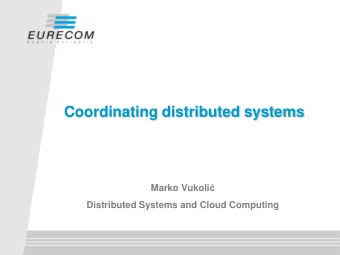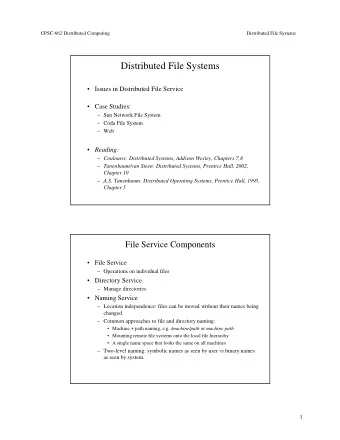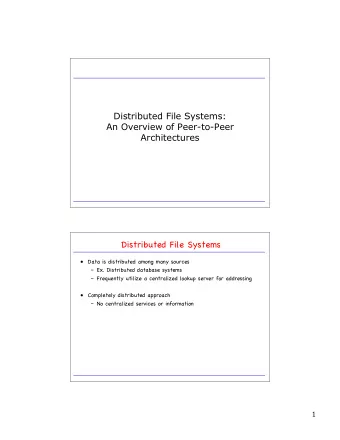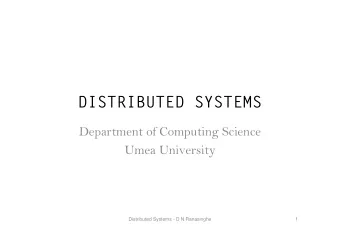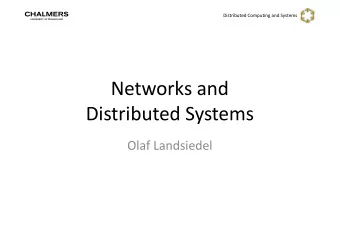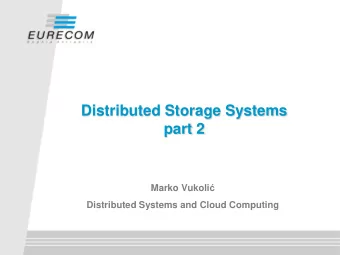
Distributed Systems Pauls aluminum laptop, but not the big or the - PDF document
My 15 MacBook Pro The rightmost computer on my desk Distributed Systems Pauls aluminum laptop, but not the big or the small one. hedwig Naming & Binding hedwig.pk.org 192.168.60.148 Paul Krzyzanowski
• My 15” MacBook Pro • The rightmost computer on my desk Distributed Systems • Paul’s aluminum laptop, but not the big or the small one. • hedwig Naming & Binding • hedwig.pk.org • 192.168.60.148 Paul Krzyzanowski • 00:14:51:ec:f2:5b pxk@cs.rutgers.edu Except as otherwise noted, the content of this presentation is licensed under the Creative Commons Attribution 2.5 License. Page 1 Page 1 Page 2 Naming things Naming Service • User names Allows you to look up names – Login, email – Often returns an address as a response • Machine names Might be implemented as – rlogin, email, web – Search through file • Files – Client-server program • Devices – Database query – … • Variables in programs • Network services Page 3 Page 4 What’s a name? Names Need names for: Name : identifies what you want – Services : e.g., time of day Address : identifies where it is – Nodes : computer that can run services – Paths : route Route : identifies how to get there – Objects within service : e.g. files on a file server Naming convention can take any format Binding : associates a name with an address – Ideally one that will suit application and user – “choose a lower -level-implementation for a higher- – E.g., human readable names for humans, binary identifiers level semantic construct” for machines RFC 1498: Inter-network Naming, addresses, routing Page 5 Page 6 1
Uniqueness of names Terms: Naming convention Easy on a small scale Naming system determines syntax for a name – Unix file names: Problematic on a large scale Parse components from left to right separated by / /home/paul/src/gps/gui.c Hierarchy allows uniqueness to be maintained – Internet domain names: Ordered right to left and delimited by . compound name : set of atomic names connected with www.cs.rutgers.edu a name separator – LDAP names Attribute/value pairs ordered right to left, delimited by , cn=Paul Krzyzanowski, o=Rutgers, c=US Page 7 Page 8 Terms: Context Terms: Naming System Connected set of contexts of the same type – A particular set of name object bindings (same naming convention) along with a common set of operations – Each context has an associated naming convention For example: – A name is always interpreted relative to some – System that implements DNS context – System that implements LDAP • E.g., directory /usr in a UNIX file system Page 9 Page 10 Terms: Name space Terms: Resolution Set of names in the naming system Name lookup – Return the underlying representation of the name For example, For example, – Names of all files and directories in a UNIX file system – www.rutgers.edu 128.6.4.5 – All domain names on the Internet Page 11 Page 12 2
Directory Service Name resolution To send data to a service: Extension of naming service: – Associates names with objects 1. Find a node on which the service resides (service – Allows objects to have attributes name resolution) – Can search based on attributes 2. Find an address (or network attachment point) for For example, that node (node name location) – Netscape directory: general-purpose directory service based on LDAP 3. Find a path from this location to the service – Directory can be object store: (routing service) • Look up printer object and send data stream to it Page 13 Page 14 Name resolution Binding E.g., access “paul’s service”: The association of a resolution Static binding File lookup: – Hard-coded “paul’s service” cs.rutgers.edu:1234 Early binding DNS lookup: – Look up binding before use cs.rutgers.edu 128.6.4.2 – Cache previously used binding ARP resolution: 128.6.4.2 08:00:20:90:9c:23 Late binding IP routing: – Look up just before use route: remus lcsr-gw aramis Page 15 Page 16 IP Domain Names Example: DNS Human readable names Internet Domain Name Service e.g. remus.rutgers.edu – Maps machine names (www.rutgers.edu) to IP addresses (128.6.4.5) Hierarchical naming scheme In the past: – No relation to IP address or network class – Search /etc/hosts for machine name – File periodically downloaded from Network Information Center (NIC) at the Stanford Research Institute (SRI) Page 17 Page 18 3
Internet Domain Name Space Domain Name Server Tree structure Essential task – Each node has resource information associated Answer queries about data in its zone with it (group of machines under a root – e.g. rutgers) – owner : domain name whose resource record is found – type of resource : • Host address (A) • Alias name (C) org edu com mil gov top-level domains: • Name server for domain (NS) • Mail server (MX) pk nyu rutgers – TTL (time to live) for caching cs www remus – Relevant data (e.g., address) www Page 19 Page 20 Sample Query Sample Query • Rutgers registers rutgers.edu with a domain Submit query to a local DNS resolver: 1. query(cs.rutgers.edu) root name server registry root name servers identify authoritative servers for top-level domains send query to A.ROOT_SERVERS.NET: 198.41.0.4 – educause.net for .edu domain 2. referral to edu name server – See internic.net for ICANN-accredited list of returns list of DNS servers for .edu: registrars for top-level domains L3.NSTLD.COM: 192.41.162.32 3. query(cs.rutgers.edu) edu name server send query to 192.41.162.32 • Top-level domain names and their associated 4. referral to rutgers.edu name servers: name server info loaded to root name servers - DNS1.rutgers.edu 165.230.144.131 - DNS2.rutgers.edu 128.6.21.9 – 13 computers: replicated information - DNS3.rutgers.edu 198.151.130.254 5. query(cs.rutgers.edu) rutgers name server – Contain addresses for all registries of top-level send query to 165.230.144.131 domains (.com, .edu , .org, …) 6. rutgers name server returns A: 128.6.4.2 address MX: dragon.rutgers.edu domain name for email Page 21 Page 22 DNS Naming: files BIND File system maps file pathname – Implementation of DNS provided by the Internet Software Consortium (www.isc.org) /home/paul/src/map.c Programs to perform queries: namei in kernel – dnsquery, nslookup, dig, host major=3, minor=6, inode=6160 Page 23 Page 24 4
The end. Page 25 Page 25 5
Recommend
More recommend
Explore More Topics
Stay informed with curated content and fresh updates.
